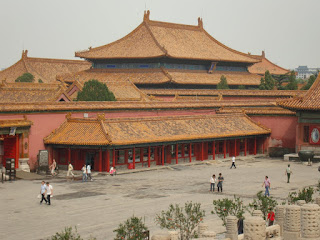












Another day, another border crossing - this time into China. It seems all the border guards had been to pre-Olympic charm school; it was all smiles and please & thank yous. Russia/Mongolia are on a different gauge to China (and the rest of the world), so the boggies have to been changed at the border. The train is split up in a large shed, then the carriages are lifted by hydraulic jacks, the Russian boggies wheeled out and the Chinesse ones rolled in. The whole process took two hours, and you do wonder whether it would have been simpler just to have swapped trains.
We arrived in Beijing early afternoon having ran parallel to a section of the great wall, and past through Beijing's endless suburbs. Smelling like a camel's arse, we showered before making contact with our man on the ground, Jamie (in Beijing on secondment, before conveniently moving to Tokyo) . We shovelled two loads of foul smelling clothes into his washing machine, before heading out for food in a typical cavernous Chinese restaurant, with display tanks for choose-your-own-fish.
We'd planed to start our sight seeing at 10:30. I naively assumed that the heavy thunder storm over night would have cleared the air, leaving bright sunshine - we got grey drizzle. Our hotel is superbly located near the north-east corner of the Forbidden City, so we entered through the north gate, opposite the normal direction of tourist flow.
We shunned the chance to listen to Sean Connery's commanding and informative audio guide, and instead opted for Jamie reading out of the Rough Guide. Hence I know very little about the place except for the eunuchs' entrance exam (hot peppered water to act as a anaesthetic, a very sharp knife, removal of the meat and two veg, and the insertion of a solder plug. Ow!). The place is indeed massive, and does a good job at absorbing the thousands of (mainly Chinese) tourists that pour through its gates every hour. The Chinese tourist some times seem more interested in their western counterparts than the buildings - we were all dragged into various holiday snaps.
After leaving through Tiananmen gate (the one from which Mao's portrait hangs), we did a sharp right and headed to Beijing's iconic egg shaped opera house. Worth a visit if you're a fan of contemporary architecture, or just fancy a break from the crowds. We finished off in Tiananmen Square, too late to queue up to see Mao's corpse (it had already been lowered into its underground freezer at this point).
That evening our Trans-Siberia entourage arranged to meet at the Sick Duck restaurant. We struggled to find the place and stood out side the Quanjude Peking Duck Restaurant for some time, before it occurred to Rob (via a quick web search on the iPod) that Sick Duck was a nickname (due to its proximity to the Peking Union Medical College Hospital). Kirsten reckons she's hand better Peking Duck in London; I meanwhile was stuck with a load of slimy mushrooms.
Wanting to avoid the tourist hoards at the overly reconstructed Badaling section of the Great Wall, we opted for a 10km hike along the Simatai section. Relatively few people do this section, and the crow thins out quickly, leaving you alone on your own bit of the Ming wall. It took us 3 hours to complete the undulating route (why build a wall along a mountain ridge to protect you from nomadic horsemen?), stopping frequently for photo ops from the watch towers. We descended from the wall via a zip wire to the lake below.
Our last day here was spent wandering round hutongs before heading out to the Summer Palace. This can offer great views back over the city from the hill top pagoda, unfortunately it had started to rain quite hard by the time we got their and visibility was down to about 20 yards. Nevertheless it is an impressive place covering 2.9 square kilometres (two thirds of it are lake) dotted with hillside pagodas linked by open passage ways. Twice burnt down by Anglo-French forces in acts of imperial aggression, most of the buildings date from 1902.
We left via Beijing West Station - a behemoth of a building - for the overnight train to Xi'an. At this point it was raining hard, and with the station scanning all baggage, quite a crush had developed outside.
All in all Beijing felt a very safe place (I had no problem wandering down unlit side-streets late at night), and the taxi are cheap (less than 20RMB, £1.60 for most journeys in town) - although no English is spoken, so it's a good idea to have the destination written down in Chinese characters.
Our cheapest (and best) meal cost 140RMB for four with beers (less than three quid each).

No comments:
Post a Comment